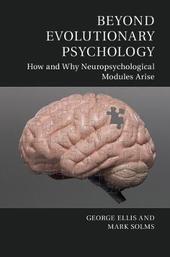
|
Beyond Evolutionary Psychology: How and Why Neuropsychological Modules Arise
Paperback / softback
Main Details
| Title |
Beyond Evolutionary Psychology: How and Why Neuropsychological Modules Arise
|
| Authors and Contributors |
By (author) George Ellis
|
|
By (author) Mark Solms
|
| Series | Culture and Psychology |
|---|
| Physical Properties |
| Format:Paperback / softback | | Pages:216 | | Dimensions(mm): Height 228,Width 152 |
|
| ISBN/Barcode |
9781107661417
|
| Classifications | Dewey:155.7 |
|---|
| Audience | | Professional & Vocational | |
|---|
| Illustrations |
11 Plates, color; 2 Halftones, black and white; 26 Line drawings, black and white
|
|
Publishing Details |
| Publisher |
Cambridge University Press
|
| Imprint |
Cambridge University Press
|
| Publication Date |
28 December 2017 |
| Publication Country |
United Kingdom
|
Description
The nature/nurture question is an age-old problem. Beyond Evolutionary Psychology deals with the relation between culture, evolution, psychology and emotion, based both in the underlying biology, determined by our evolutionary heritage, and in the interaction of our brain with the physical, ecological and social environment, based in the key property of brain plasticity. Ellis and Solms show how the brain structures that underlie cognition and behaviour relate to each other through developmental processes guided by primary emotional systems. This makes very clear which brain modules are innate or 'hard-wired', and which are 'soft-wired' or determined through environmental interactions. The key finding is that there can be no innate cognitive modules in the neocortex, as this is not possible on both developmental and genetic grounds; in particular there can be no innate language acquisition device. This is essential reading for students and scholars of evolutionary psychology and evolutionary biology.
Author Biography
George Ellis is Emeritus Professor in the Mathematics Department at the University of Cape Town, and visiting Professor in the Physics Department, University of Oxford. He co-authored, with Stephen Hawking, The Large Scale Structure of Space-Time (Cambridge, 1975). He has been awarded the Star of South Africa Medal by President Nelson Mandela, the Order of Mapungubwe by President Thabo Mbeki, and the Templeton Prize. He has many awards including six honorary doctorates, the latest being awarded by the University of Paris. His latest book is How Can Physics Underlie the Mind? Top-Down Causation in the Human Context (2016). Mark Solms is a psychoanalyst and a Professor in Neuropsychology. He currently holds the Chair of Neuropsychology at the University of Cape Town and Groote Schuur Hospital, and is the President of the South African Psychoanalytical Association. He is also currently Research Chair of the International Psychoanalytical Association and Science Director of the American Psychoanalytic Association. Solms founded the International Neuropsychoanalysis Society in 2000 and was a Founding Editor of the journal Neuropsychoanalysis. He has published over 350 articles and chapters, and seven books, the latest being The Brain and the Inner World (2002, translated into thirteen languages) and The Feeling Brain (2015, his selected papers). He is the lead educator of the free online course 'What is a Mind?' on the platform FutureLearn.
Reviews'The work is a tour de force in the area of culture, evolution, psychology and emotion, and in short is brilliant. Ellis and Solms have synthesized and integrated large, disparate areas of scholarship and have developed an insightful and amazingly thought-provoking theoretical framework that is entirely new. I especially liked the focus on language, as tackling the potential innateness versus learned aspect of it is persuasive and strategically sound.' David Matsumoto, San Francisco State University 'This is a fascinating and timely book that emerges as lively debates are taking place. Ellis and Solms's highly novel and empirically grounded theorizing about the development of language and cognition has broader implications for facile popular notions such as a 'triune brain' or evolutionary-based intuitionist accounts of the role of emotion in morality and everyday cognition.' Larry Nucci, University of California, Berkeley 'George Ellis and Mark Solms's book is one of the more forceful, sustained explanations of the origins of the cognitive accomplishments of Homo sapiens available. They offer a more balanced and scientific understanding of human cognitive evolution than either the radical nativism of Evolutionary Psychology or Chomskyan linguistics. All cognitive scientists, anthropologists, psychologists and philosophers should have this book on their shelves.' Daniel Everett, Bentley University, Massachusetts, and author of Don't Sleep, There Are Snakes, Language: The Cultural Tool, Dark Matter of the Mind: The Culturally Articulated Unconscious, and How Language Began: The Story of Humanity's Greatest Invention 'Beyond Evolutionary Psychology is a rich book, jam-packed with impressive detail ...' Lachlan Douglas Walmsley, The Quarterly Review of Biology
|